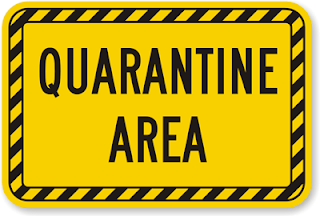Okay, when we last
addressed
this subject in a posting, we were in the middle of helping prepare a “subject
paper” (or whatever you want to call it) on the Covid-19 virus and its economic
impact. The preparation of the paper
proved to be a bit more involved than originally anticipated (although well
worth the effort), so instead of closing this particular series of blog
postings with a summary of the paper, we’ll end by serializing the paper itself. Of course, if you want to read the whole
paper at one go (it’s actually pretty short), you
can do so by clicking on this link.
UNIVERSALIZING
CAPITAL OWNERSHIP
How Article 17 of the Universal Declaration of Human Rights Can Save the
Economy
April 17, 2020
Center for Economic and Social Justice (CESJ.org), April 17, 2020
Part I
Executive
Summary
America and the rest of the global
community face a health and economic disaster on the scale of a world war.
Unlike violent wars, the isolation policies needed in today’s COVID-19 war have
prevented millions of workers from leaving their homes and physically working
together to produce essential services, medical technologies and medicines
needed to defeat the coronavirus.
Small- and medium-size businesses have
closed, laying off millions of workers, perhaps permanently. From mid-March
through mid-April 2020, a record 22 million US workers filed for federal
unemployment benefits. Farmers and other food producers were forced to destroy
crops that couldn’t be harvested and products that couldn’t be shipped to
grocery stores, restaurants or food banks.
While the economy is in a state of
induced coma, the US and other governments are undertaking radical central
banking interventions to keep their economies from total collapse and restart
production once the pandemic is ended. Their present strategies will create
trillions of dollars backed by nothing but massive government debt. None of
these plans indicate how the trillions of “emergency money” created will be
repaid, or how future production will be created in ways that generate the mass
purchasing power needed to buy those future goods and services. This has posed
an historic challenge to the wage-welfare systems of all nations.
Meanwhile, the US and China are
competing for leadership in advanced 5G communications and energy systems,
robotics, artificial intelligence and other technologies, which will soon power
automated factories and hospitals, self-driving cars and more.
This paper proposes a fundamentally
different strategy, suggesting immediate emergency measures, but focusing on
structural changes to the monetary and tax system that can finance the building
of a green economy that provides equal access to a new source of independent
incomes for every person. It posits:
Today’s war cannot be won until the
COVID-19 coronavirus is halted everywhere. Before millions of lives are lost
world-wide, the speed required to defeat the novel coronavirus calls for
coordinating the knowledge, research and production capabilities of all nations
working together. Nations united should copy the World War II monetary policies
that funded the “Manhattan Project,” which created the atomic bomb to end that
war.
Rebuilding a collapsed global economy
calls for a strategy like the post-war Marshall Plan, but requiring far more
money. Such a plan must also prevent the unjust concentrations of money,
capital ownership and economic power that followed the post-World War II
reconstruction program that included the formation of the United Nations and
its Universal Declaration of Human Rights.
Article 17 of the Universal
Declaration of Human Rights affirmed the fundamental human right of every
person to own productive capital “alone as well as in association with others.”
To achieve economic revitalization, sustainability and justice for every
person, all nations should reaffirm their support of Article 17, and look to a
new monetary paradigm with financial tools that promote a more inclusive and
non-monopolistic, free market-based approach to money, banking, and tax
policies needed to win the war against the COVID-19 coronavirus.
Along with effective emergency
measures, leaders in the political, banking, insurance, business, union,
spiritual and academic worlds should launch an aggressive program for
universalizing citizen access to ownership of future productive capital assets
and infrastructure. These new capital assets should include new green
technologies, green energy systems and green production processes to protect
the environment. This would revive the productive sector by democratizing
future ownership power, work opportunities and sustainable purchasing power
among every citizen, without threatening existing property rights of current
capital owners.
*
* *
#30#



